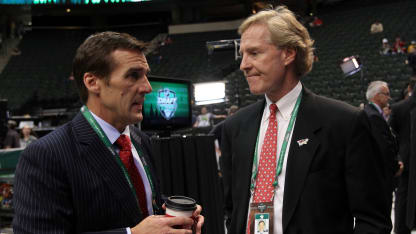It's something that separates hockey from other sports.
The Draft.
Not the widely-publicized Expansion Draft, from which the Golden Knights will select one player from each of the NHL's 30 teams this June. Rather, the Entry Draft, which will be held at Chicago's United Center on June 23 and 24, will have a more significant impact on the Golden Knights' fortunes than any other event this year.
That is, if history is any indication.
History shows that championship success is more connected to Entry Draft success in hockey than in any other sport. That rather than titles being decided by which teams offer the most money to the most established veterans, NHL success comes from the ability to pluck teenagers out of junior leagues and colleges across the world and turn them into pros.
Although this may be a small sample size, the prevalence of this pattern is readily apparent when analyzing the rosters of the past three champions in every sport.
McPhee Details His Aggressive Entry Draft Philosophy
The Golden Knights' general manager recently discussed his 'swing for the fences' approach

© Bruce Bennett/Getty Images


















